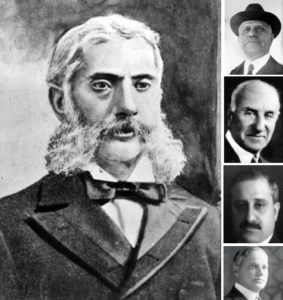Mayor of Mexico City
 Claudia Sheinbaum Pardo (b. 1962) was born in Mexico City to a family of Jewish immigrants. Her father is an Ashkenazi Jew of Lithuanian heritage, while her mother is a Sephardic Jew from Bulgaria. Both of her parents were respected scientists, and Sheinbaum followed in their footsteps. She studied physics and went on to earn a Ph.D in energy engineering. She did research at a US Department of Energy lab in California. In 1995, Sheinbaum became a professor at the National Autonomous University of Mexico. A few years later, she won the prize for “young researcher in engineering and technological innovation”. Sheinbaum soon became a leading expert on climate change and the environment. She has published over 100 scientific papers and two books. In 2000, she was appointed Mexico City’s Secretary of the Environment, and served in the role for the next six years. Following this, she joined the Intergovernmental Panel on Climate Change (IPCC) and did important work for the organization that helped it win the Nobel Peace Prize. In 2015, Sheinbaum became the mayor of Tlalpan, one of Mexico City’s 16 boroughs. Soon after, she was nominated for mayor of all of Mexico City, and won a six-year term in 2018, easily beating out six other candidates in a landslide. Sheinbaum became the city’s first-ever Jewish mayor, and its first elected female mayor, too. Since then, she has been praised for her work in managing North America’s largest city. She has made significant strides in cleaning it up and reducing waste, fighting corruption, modernizing the transportation system, and upgrading sanitation. She has also been commended for her handling of the coronavirus pandemic. Earlier this year, she was nominated for the World Mayor prize, awarded biennially to the best city leaders on the globe. Some are already predicting her to be a strong candidate for the 2024 Mexican presidential election. Sheinbaum was included in the BBC’s 100 Women, and was recently ranked among the world’s 50 Most Influential Jews.
Claudia Sheinbaum Pardo (b. 1962) was born in Mexico City to a family of Jewish immigrants. Her father is an Ashkenazi Jew of Lithuanian heritage, while her mother is a Sephardic Jew from Bulgaria. Both of her parents were respected scientists, and Sheinbaum followed in their footsteps. She studied physics and went on to earn a Ph.D in energy engineering. She did research at a US Department of Energy lab in California. In 1995, Sheinbaum became a professor at the National Autonomous University of Mexico. A few years later, she won the prize for “young researcher in engineering and technological innovation”. Sheinbaum soon became a leading expert on climate change and the environment. She has published over 100 scientific papers and two books. In 2000, she was appointed Mexico City’s Secretary of the Environment, and served in the role for the next six years. Following this, she joined the Intergovernmental Panel on Climate Change (IPCC) and did important work for the organization that helped it win the Nobel Peace Prize. In 2015, Sheinbaum became the mayor of Tlalpan, one of Mexico City’s 16 boroughs. Soon after, she was nominated for mayor of all of Mexico City, and won a six-year term in 2018, easily beating out six other candidates in a landslide. Sheinbaum became the city’s first-ever Jewish mayor, and its first elected female mayor, too. Since then, she has been praised for her work in managing North America’s largest city. She has made significant strides in cleaning it up and reducing waste, fighting corruption, modernizing the transportation system, and upgrading sanitation. She has also been commended for her handling of the coronavirus pandemic. Earlier this year, she was nominated for the World Mayor prize, awarded biennially to the best city leaders on the globe. Some are already predicting her to be a strong candidate for the 2024 Mexican presidential election. Sheinbaum was included in the BBC’s 100 Women, and was recently ranked among the world’s 50 Most Influential Jews.
Words of the Week
When I find the road narrow, and can see no other way of teaching a well-established truth except by pleasing one intelligent man and displeasing ten thousand fools, I prefer to address myself to the one man, and to take no notice of the condemnation of the multitude.
– Rabbi Moshe ben Maimon (1138-1204), “Maimonides”, Guide for the Perplexed



